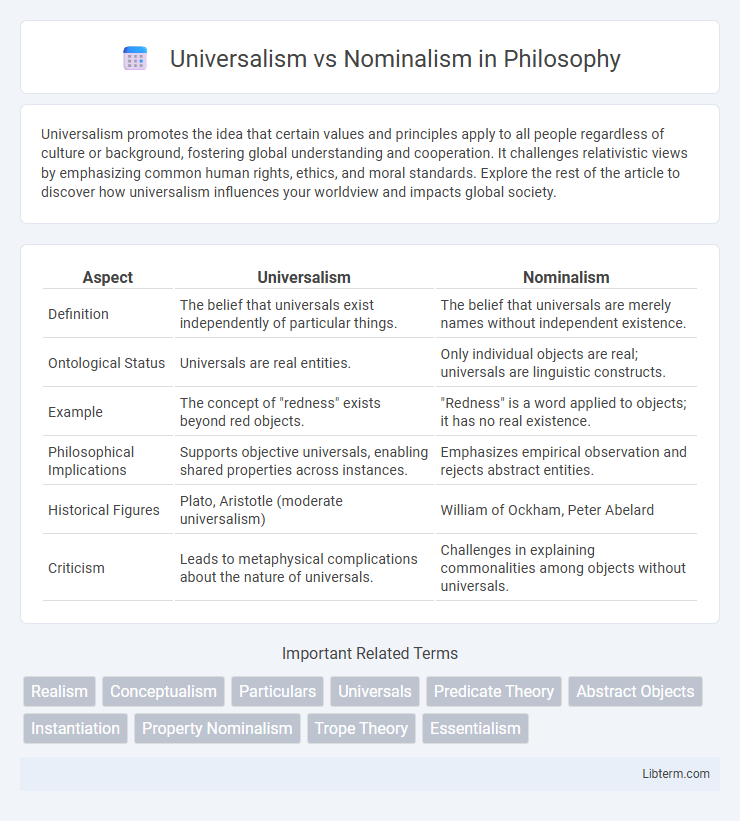Universalism promotes the idea that certain values and principles apply to all people regardless of culture or background, fostering global understanding and cooperation. It challenges relativistic views by emphasizing common human rights, ethics, and moral standards. Explore the rest of the article to discover how universalism influences your worldview and impacts global society.
Table of Comparison
| Aspect | Universalism | Nominalism |
|---|---|---|
| Definition | The belief that universals exist independently of particular things. | The belief that universals are merely names without independent existence. |
| Ontological Status | Universals are real entities. | Only individual objects are real; universals are linguistic constructs. |
| Example | The concept of "redness" exists beyond red objects. | "Redness" is a word applied to objects; it has no real existence. |
| Philosophical Implications | Supports objective universals, enabling shared properties across instances. | Emphasizes empirical observation and rejects abstract entities. |
| Historical Figures | Plato, Aristotle (moderate universalism) | William of Ockham, Peter Abelard |
| Criticism | Leads to metaphysical complications about the nature of universals. | Challenges in explaining commonalities among objects without universals. |
Introduction to Universalism and Nominalism
Universalism in philosophy posits that universals--abstract properties or concepts like redness or beauty--exist independently of particular objects. Nominalism rejects this, arguing that only particular objects are real and universals are merely names or labels we use to describe common features. This fundamental debate shapes metaphysical and epistemological perspectives on the nature of reality and language.
Historical Origins of the Debate
The debate between Universalism and Nominalism originated in medieval scholastic philosophy, notably during the 11th and 12th centuries, as theologians and philosophers sought to understand the nature of universals and their existence. Early proponents like Plato influenced Universalism by asserting that universals exist independently and prior to particulars, whereas Nominalism, championed by thinkers such as William of Ockham, argued that universals are mere names or mental constructs without independent reality. This foundational dispute shaped metaphysics and epistemology throughout the Middle Ages, influencing the development of Western philosophical thought.
Key Philosophical Definitions
Universalism asserts that universals--abstract concepts such as "redness" or "justice"--exist independently of particular instances, serving as real, objective entities. Nominalism denies the independent existence of universals, claiming that only individual, specific objects exist and that universals are mere names or linguistic constructs without inherent reality. This fundamental distinction shapes debates in metaphysics regarding the nature of reality, language, and classification.
Universalism: Main Arguments and Proponents
Universalism asserts that universals--concepts like redness or humanity--exist independently of particular instances, grounding objective knowledge and shared meaning. Key proponents such as Plato argue that these abstract entities reside in a realm beyond physical reality, while medieval philosophers like Thomas Aquinas integrated universal forms with Christian theology to account for the unity of beings. Universalism underpins essential philosophical debates in metaphysics and epistemology, emphasizing the existence of eternal, immutable truths.
Nominalism: Core Principles and Thinkers
Nominalism asserts that universals are mere names without any independent existence, emphasizing that only particular objects are real and that general terms do not correspond to inherent realities. Key thinkers such as William of Ockham championed this view, arguing that concepts are mental constructs used for classification rather than reflections of external entities. This approach significantly influenced medieval philosophy and the development of modern empiricism by challenging the existence of abstract universals.
Impact on Metaphysics and Ontology
Universalism asserts the real existence of universals as abstract entities, shaping metaphysics by affirming that properties and types have an objective, mind-independent status. Nominalism challenges this by denying universals' independent existence, influencing ontology to focus on particular, concrete objects and linguistic conventions instead. This debate fundamentally alters how identity, classification, and the nature of reality are conceived within metaphysical frameworks.
Application in Contemporary Philosophy
Universalism in contemporary philosophy emphasizes the existence of abstract, universal concepts that apply across contexts, serving as foundational principles in ethics, language, and metaphysics. Nominalism rejects these universals, asserting that only particular objects exist and that universals are mere names or linguistic constructs without independent reality. This debate shapes current discussions on ontology, cognitive science, and the philosophy of language, influencing how philosophers address issues of meaning, classification, and the nature of reality.
Criticisms of Universalism
Criticisms of Universalism argue that abstract universals lack independent existence, making them metaphysically problematic and cognitively unnecessary. Opponents highlight the "Third Man Argument," which challenges the infinite regress in positing universal forms beyond particular objects. Empirical evidence from modern philosophy and science favors Nominalism, emphasizing the primacy of individual entities and rejecting universal essences.
Objections to Nominalism
Nominalism faces significant objections regarding its inability to account for the objective existence of universals, leading critics to argue that it reduces abstract concepts to mere names without ontological status. This view struggles to explain the commonality observed among individual entities and the basis for shared properties, which realist theories assert as evidence of universals' reality. Furthermore, objections highlight that nominalism complicates the understanding of meaning and reference in language, as it denies the existence of universal forms that underpin semantic coherence.
Universalism vs Nominalism: Modern Implications
Universalism, affirming the existence of abstract universals independent of human cognition, influences contemporary debates in metaphysics and linguistics by supporting the objectivity of categories and concepts. Nominalism, which denies inherent universals and treats them as mere names or labels without independent existence, challenges cognitive science and artificial intelligence approaches that rely on fixed classifications. Modern implications of this philosophical debate emerge in ontology design, knowledge representation, and legal theory, shaping how systems and frameworks interpret the universality or particularity of concepts.
Universalism Infographic

 libterm.com
libterm.com